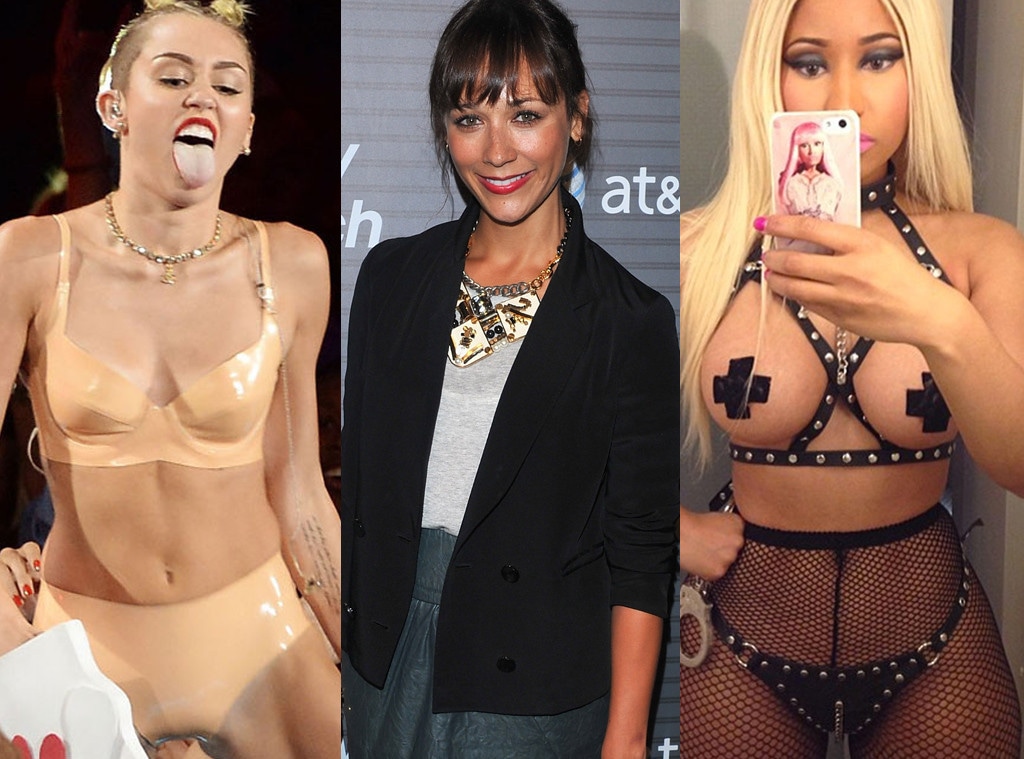 Alberto E. Rodriguez/Getty Images; Theo Wargo/WireImage; Instagram
Alberto E. Rodriguez/Getty Images; Theo Wargo/WireImage; InstagramIf you felt like you got to third base with a slew of female pop stars this year, you are not alone.
Rashida Jones reasons that thanks to Miley Cyrus, Rihanna, Nicki Minaj, Lady Gaga and their scantily clad contemporaries, "2013 was the Year of the Very Visible Vagina." The 37-year-old actress expressed her frustrations with the whole "sex sells" mentality—and her hopes for a more-clothed 2014—in a December 2013 Glamour essay.
The Parks and Recreation star began by pointing out that "stripper poles, G-strings, boobs, and a lot of tongue action were all now normal accessories for mainstream pop stars." These artists, she reasons, are all trying to convey the same message: "You know you want to have sex with me. Here, take a look at lots of parts of my body."
Rashida, pointing out she's not "a prude," loves sex and "also grew up on a healthy balance of sexuality in pop stars" finds all the in-your-face imagery of today to be "homogenous." Every pop star, she writes, "interprets 'sexy' the same way: lots of skin, lots of licking of teeth, lots of bending over."
"I find this oddly...boring," she continues. "Can't I just like a song without having to take an ultrasound tour of some pop star's privates?"
The Harvard graduate first publicly voiced her frustrations on these matters in a series of tweets posted in October, quipping that the Mileys and Rihannas of today should "be SEXY," sure, "but leave something to the imagination." She received a lot of backlash for expressing this opinion and particularly for her use of the hashtag #stopactinglikewhores."
Rashida admits, in her Glamour essay published two months after those initial tweets, that "the fact that I was accused of 'slut-shaming,' being anti-woman and judging women's sex lives crushed me."
"I consider myself a feminist. I would never point a finger at a woman for her actual sexual behavior, and I think all women have the right to express their desires," she writes. "But I will look at women with influence—millionaire women who use their 'sexiness' to make money—and ask some questions. There is a difference, a key one, between 'shaming' and 'holding someone accountable.'"
She also points out that "the poles, the pasties [and] the gyrating" aren't "showing female sexuality; this is showing what it looks like when women sell sex." In her opinion, pop culture has "reached a point of oversaturation."
But Rashida, "an optimistic woman," has high hopes for "a slightly more clothed, more original 2014." But how will this actually happen? She asks that record executives "try to apply some of your own personal moral parameters" to the pop stars they market, women "at least try to discuss the larger implications of female sexuality on pop culture without shaming each other" and men "talk to us about how all this makes you feel."
Lastly, she wants the pop stars themselves to stop "saying you don't want to be role models," pointing out that they are exactly that, and they depend on the millions of fans buying what they're selling. "So maybe just consider some sort of moral exchange program" she writes, "in the same way that carbon credits make people feel better about driving an SUV."
She also suggests that young females in the entertainment industry throw in some material of more substance—"maybe even a song that empowers women to feel good about some other great quality we have? Like, I don't know...our empathy, or childbearing skills, or ability to forgive one another for mean tweets?"
She definitely makes some good points. And one, which is a great takeaway regardless of where you stand on the whole explicitly sexualized pop star debate, is that, "There's more than one way to be a good feminist."
Amen.